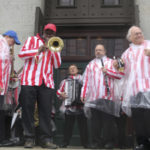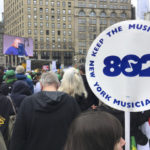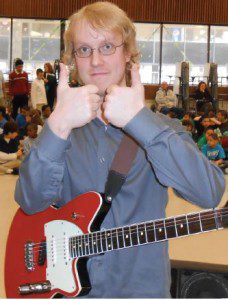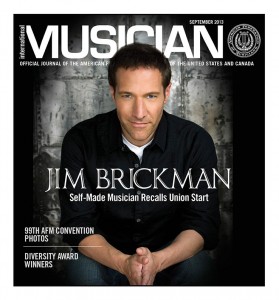At the end of September, musicians of the Cleveland Orchestra, represented by Local 4 (Cleveland, OH), ratified a four-month modification to their current Collective Bargaining Agreement (CBA). The modification is effective through January 31, 2021, and the CBA is set to expire August 29, 2021. After January 31, the originally bargained contract terms will be reinstated, unless otherwise negotiated and agreed upon. Previously, on April 1, salaries had been reduced to 80% and later to 70% of original wages. Under the four-month modification, compensation returns to 80%. Musicians will continue to receive their quarterly EMG. Orchestra size remains at 100 musicians, and paid COVID administrative leave may be used by those who have been exposed to COVID-19 or those at high risk for contraction.
Tag Archives: Local 4
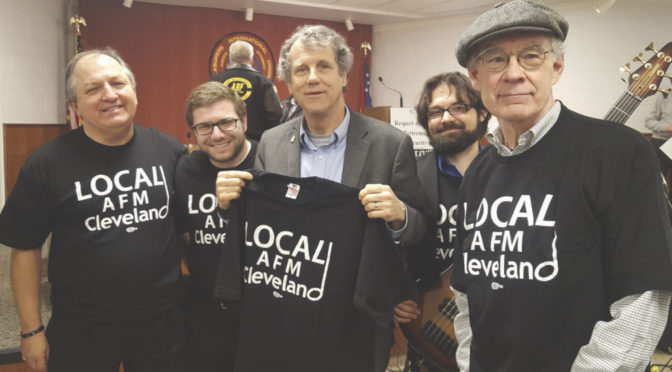
Senator Sherrod Brown Holds Cleveland Pension Rally with Labor Leaders
In March, Senator Sherrod Brown (OH-D) held a rally on his work and commitment for retirement security. The event was hosted by several organizations including the Cleveland AFL-CIO Retiree Council, Senior Voice!, and AFM Local 4 (Cleveland, OH). Brown is co-chair of the Joint Congressional Select Committee on Multi-Employer Pension Plans.
“Sherrod Brown has a long history as an independent voice for working-class Ohioans and their families. In addition to championing our earned retirement benefits, Senator Brown remains one of our strongest advocates for fair trade, social and economic justice, and sensible health care policies,” says Local 4 President Leonard DiCosimo.
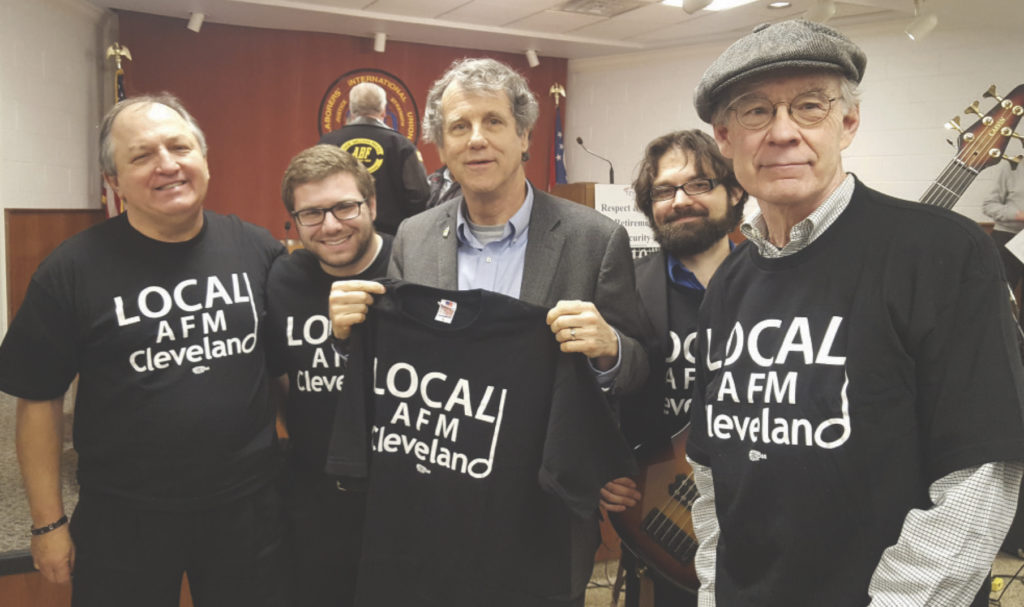
Local 4 (Cleveland, OH) musicians presented Senator Sherrod Brown (OH, D) with a Local 4 T-shirt at a rally in Cleveland. (L to R) are Ed Majeski, Evan Mitchell, Brown, Jeremey Poparad, and Todd Smith.
For more information on the joint committee’s work and pension progress, please read AFM Legislative-Political Director Alfonso Pollard’s column here.
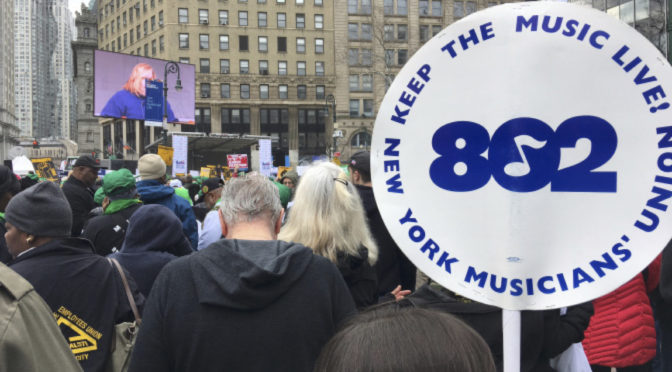
AFM Members Join in Working People’s Day of Action
Working People’s Day of Action was about demanding an end to the rigged economy and defending our freedoms. On February 24, working people across the country came together to defend our freedoms and fight for decent and equitable pay for our work, affordable health care, quality schools, vibrant communities, and a secure future for all.
Working People’s Day of Action was planned to take place in advance of the February 26 US Supreme Court hearings in Janus vs. AFSCME. The anti-union forces behind this case simply do not believe that working people should be afforded the same freedoms and opportunities as they are.
The day also recalls when Dr. Martin Luther King came to the aid of Memphis sanitation workers in February 1968. They were protesting discrimination, low pay, and inhumane conditions that had led to the gruesome death of two workers on the job. On February 12, the sanitation workers went on strike to demand that their dignity, their humanity, and their union be recognized. On February 21, the strikers began to march every day, carrying signs that boldly proclaimed, “I AM A MAN.”
This year, on February 24, working people and their allies joined together to demand an end to an economy that’s rigged against working people and defend the freedoms that Dr. King fought and died for. As Dr. King told the sanitation workers in Memphis, “Freedom is not something that is voluntarily given by the oppressor. It is something that must be demanded by the oppressed.”
AFM members across the country joined demonstrations with their union brothers and sisters to stand up for the right to unionize. Among them, Local 655 (Miami, FL) President Charles “Chas” Reskin, Secretary-Treasurer Jeffrey Apana, and other musicians attended a rally at Bayfront Park in Miami. Among representatives of Local 802 at the New York City rally were Maria DiPasquale and CLC delegate Marvin Moschel. In Washington, DC, demonstrators, including Local 161-710 Executive Board Director Doug Rosenthal, gathered at Freedom Plaza. Local 4 (Cleveland, OH) chartered a bus and filled it with musician members to participate in a Columbus rally.
“Under current law, every public service worker may choose whether or not to join the union—but the union is required to negotiate on behalf of all workers, whether they join or not. Since all the workers benefit from the union’s gains, it’s only fair that everyone chip in toward the cost. That’s why 40 years ago a unanimous Supreme Court approved the kind of cost-sharing arrangements known as ‘fair share.’ The Janus v. AFSCME case is an effort to outlaw this fair share procedure,” explains Local 4 President Leonard DiCosimo.
Representatives of Cleveland Jobs with Justice and the North Shore AFL-CIO Federation of Labor joined Local 4 on their bus. “Though the Janus case deals with public employees,” DiCosimo says, “it is still relevant to the primarily private-sector employees of the AFM. Our presumption is that, if the ruling is in favor of Janus, there will be a movement to get a case before the Supreme Court that is basically the same dynamic for private-sector unions.”
Cleveland Receives $15 Million Gift
Richard and Emily Smucker have pledged $15 million to The Cleveland Orchestra in celebration of its 100th season. The gift will fund artistic and education programs, with an emphasis on young people. In addition, a significant portion of the gift will support the orchestra’s endowment. The Smuckers have designated $3 million of their pledge as a challenge grant.
“The work these musicians do inspires audiences and young people throughout our community, across the nation, and around the world,” says Richard K. Smucker, who serves as president of The Cleveland Orchestra’s board of directors. “From my own life experience, I know that music has the power to change lives.” The musicians are members of Local 4 (Cleveland, OH).
Richard Smucker retired from his position as chief executive officer of the J. M. Smucker Company in 2016. He was elected board president of The Cleveland Orchestra March 2017; he has served on the board of trustees since 1989.
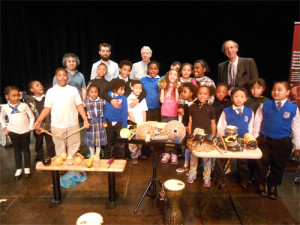
Local 4 Music Fund Academic Residency Calendar Expands Offerings in 2015
The Local 4 Music Fund, a nonprofit organization run by Local 4 (Cleveland, OH), just concluded its fourth annual Academic Residency Calendar (ARC) partnership with local government and arts and philanthropic organizations to present music residencies in Cuyahoga and Lorain County, Ohio.
The generous support of the Char and Chuck Fowler Family Foundation, and additional grants from Cuyahoga Arts and Culture, the Cyrus Eaton Foundation, and Green Family Foundation, have allowed ARC to expand its footprint this year. The educational partners cover every corner of Local 4’s jurisdiction.
“As supporters of both arts and education in Northeast Ohio, we value the experience and enrichment activities the Local 4 partners bring to students. Incorporating arts, in particular music, into the school day and learning process is critical in educating the whole child,” states Char and Chuck Fowler Family Foundation Trustee Holley Fowler Martens.
At the Rainey Institute, a three-day residency with the Percussion Marketing Council (PMC) brought percussion education and experience to more than 50 students. Three different programs brought a better understanding of the many unique instruments and sounds associated with drums, percussion, and player-performance.
Each student received his or her own shaker egg, provided by the Clevelander Drum Company. Complimentary educational DVDs and
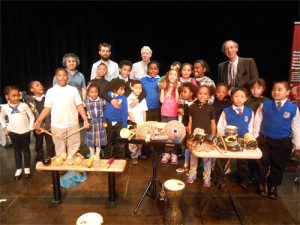
In back (L to R) are Local 4 percussionists Dan Price, Jay Ganser, George Kiteley, and Karl Dustman with Rainey Institute students.
brochures were also distributed by the PMC and the NAMM Foundation. PMC Executive Director (and Local 4 member) Karl Dustman says, “The Percussion Marketing Council is honored to lend its support to the Local 4 Music Fund for this first-time drumming experience. The Rainey Institute is the perfect venue to reach as many children as possible.” The residency program included Dustman demonstrating basic instruction/playing techniques, a performance by Duo Anime, and an all-hands-on drum circle.
Roots of American Music educational artists presented a roots to rock program that helped students write and perform their own songs over the course of five classroom visits. Students were exposed to traditional American music styles such as blues, jazz, rock, and country. The students then selected a song style to accompany their own original lyrics. A final performance with a band of professional musicians allowed students to showcase their songs.
Blue Water Chamber Orchestra has been an annual partner since ARC’s inception. Highlights of their fall residencies at Saint Ignatius High School were: classroom instruction integrating music and theory into history, physics, and theology lessons; lunchtime performances by classical chamber ensembles; and all-school assemblies by the chamber orchestra.
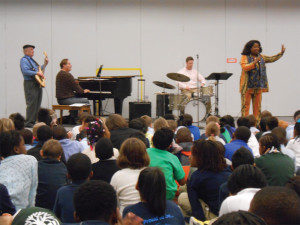
Soprano Pat Harris, accompanied by pianist Dan Maier, bassist Bob Fraser, and drummer Mark Grey, perform for attentive students at Campus International School.
This February, Waterloo Arts became an ARC partner for Black History Month at the Campus International School at Cleveland State University.
A program with soprano Pat Harris performing operatic arias, art, and popular songs of several American eras, from the Reconstruction Era to present day, was interspersed with historical anecdotes to bring multiple contexts to the music.
“In addition to providing our musicians with employment opportunities, the expansion of our nonprofit programs strengthens and improves the role of a labor union to its members and community. We are pleased to attract positive attention for the AFM, Local 4, and the organized labor movement in general,” says Local 4 President Leonard DiCosimo.
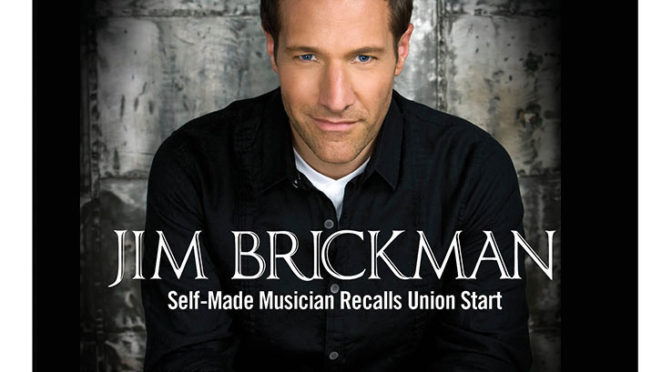
Jim Brickman
Jim Brickman of Local 4 (Cleveland, OH) jumped into the music industry early. While still in school in 1980, he started his own company, The Brickman Arrangement, from his dorm room at the Cleveland Institute of Music. He used his natural inclination toward hook writing and his pop sensibilities to start composing jingles for companies like Isuzu, McDonald’s, and Pontiac.
“I always had a knack as a songwriter in writing hooks, but I wasn’t mature enough as a songwriter to write about life or love,” he says at age 51, looking back on his youthful lack of experience. “I wasn’t in touch with myself enough to write a meaningful song. But when you’re a jingle writer copy points are presented to you and you craft the music and lyrics to fit the product—it has borders around it, structure.”
“Every day is a different style of music. It’s an incredible education, in a short time, and very challenging especially at 18 or 21 years old,” he says. It was a great entry point to songwriting and producing in a town that doesn’t offer many choices.”
That’s when Brickman first joined the union. The AFM helped him a great deal when it came to contracts, but soon he discovered many other benefits.
“In Cleveland, it was advocacy,” he says. “You could go to them [the AFM] with questions, especially with commercial jingles. I was always interacting with them about how to get paid, how to find new people, and ways to work within [a contract].”
Though Brickman is today the most charted male adult contemporary artist, with six gold and platinum albums, those early jingle-writing experiences still affect him. When he got his start, artists like Michael Bolton, Cyndi Lauper, and Marc Cohn of Local 802 were singing commercials and Brickman took advantage of his contact with the more experienced performers.
“Some of them, I’d call up and they’d talk to me. Now, thinking back, I guess I was really tenacious. They didn’t have to be as nice, or respond the way they did. Lots of people really took a chance on me and believed in me at a really early age,” he says, adding that it’s unlikelytoday that a 20-year-old kid would be the producer of a bank commercial.
After more than two dozen albums and having worked with artists including Kenny Loggins, Herb Alpert, and Dave Koz of Local 47 (Los Angeles, CA), Olivia Newton-John, Richie McDonald of Local 257 (Nashville, TN), Michelle Wright of Local 149 (Toronto, ON), and more, Brickman can still be considered tenacious, branching out in many different directions.
“I always look for what’s next and opportunities,” he says. “You can get down about where you are—if things aren’t working or you’re not selling enough. Looking forward is always important.”
Brickman started releasing albums in 1994 with No Words and the single “Rocket to the Moon” became the first solo instrumental ranked on Billboard charts. His second album, By Heart, was released in 1995, and he continued to release albums almost annually after that. He’s had two Grammy nominations, received a SESAC “Songwriter of the Year” award, and a Canadian Country Music Award for “Best Vocal/Instrumental collaboration.” A new Christmas album is due out later this year.
He also hosts the weekly radio program Your Weekend with Jim Brickman that’s heard on 80 radio stations, has organized annual fan cruises for seven years, and even held a songwriting workshop weekend in Nashville this July. All of that is on top of his almost year-round touring schedule, where he visits much of the US each year. Touring is another area where he says his AFM membership continues to help him.
“When I’m looking for musicians to tour, in smaller towns especially, it’s easier,” he says about his union contacts, adding that he’s also grateful that the organization is there to back them up. “In New York, L.A—they’re making sure that their members are taken care of, that union musicians are getting a fair shake.”
One of the most commercially successful pop pianists and songwriters of the past two decades, Brickman credits his achievements to hard work and putting in the hours, though he emphasizes that he’s not a proponent of telling other musicians what will or won’t work for them. Above all, for him, it was about being committed to being a musician.
“Music has to come first, and it can’t be a choice,” he says. “Like, ‘Should I be an insurance salesman or a musician?’ If there’s an ‘or,’ then it’s not something that’s meant to be, I think. I never felt that I had a choice.”
“Then, take every chance you have to go play, wherever you can,” he adds, but it’s not about being “discovered.”
“I think there’s a message sent out by these talent shows that all you have to do is wait in line to show someone your technique,” he says, referring to shows like American Idol. “For longevity in your career, you have to build it slowly. It really is a marathon. If you want to last, you have to get out and do it. It doesn’t matter if it’s for five people or 5,000.”
He also advises young musicians to join the union, but don’t expect that they are going to make your career happen for you. “It’s always a two-way street,” he says. “You have to be involved and advocate for yourself. I think it’s important to have dialogue and not necessarily think what they’ll do for you. The AFM will help you, but you have to be involved.”


